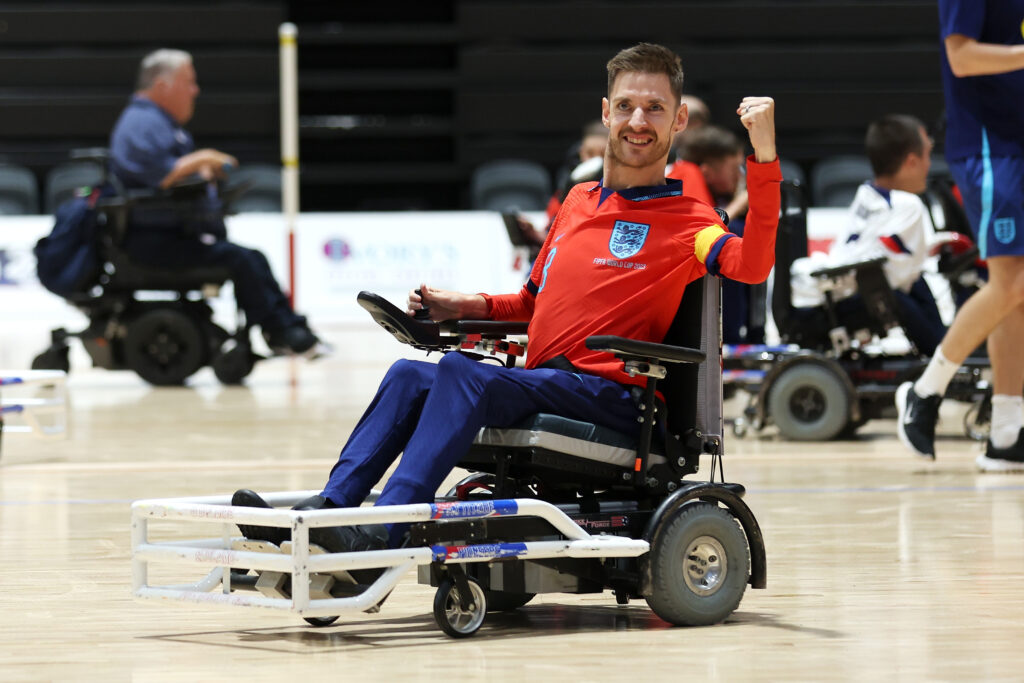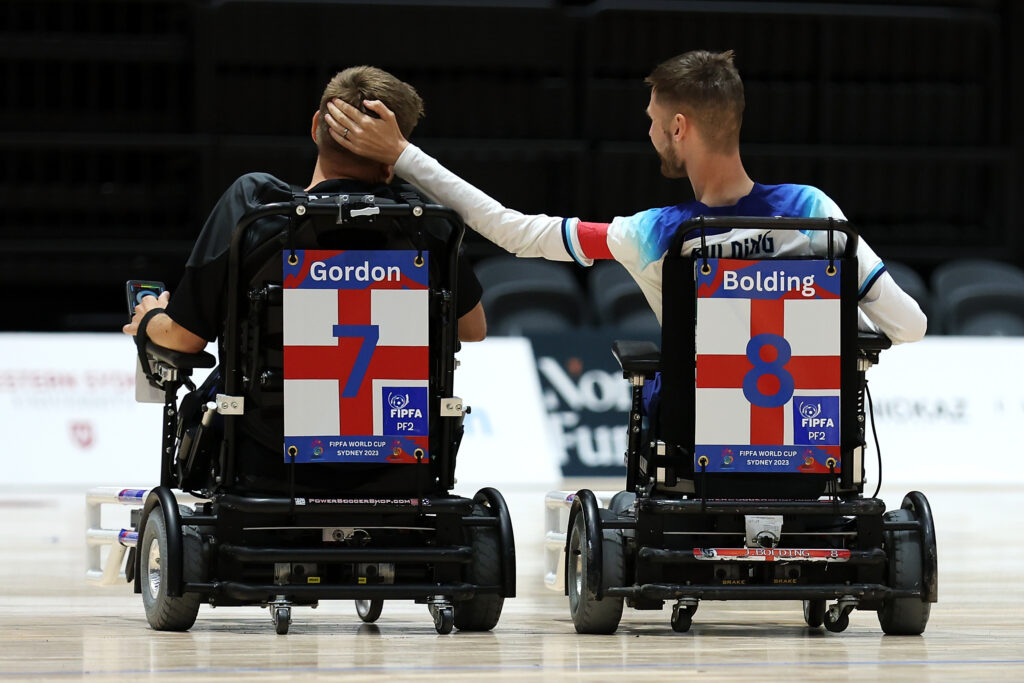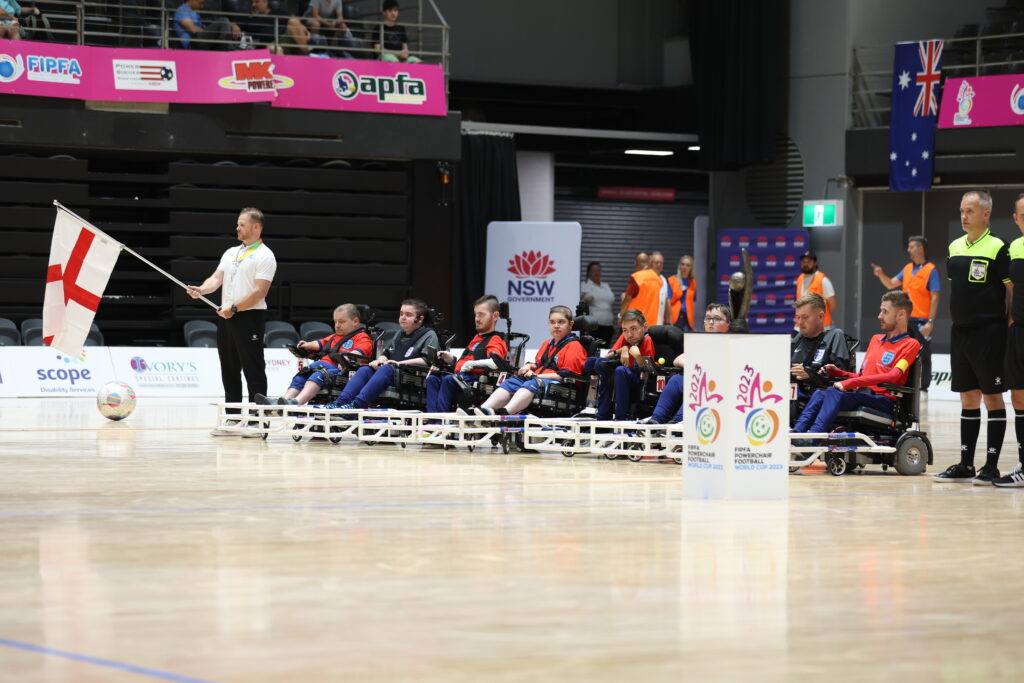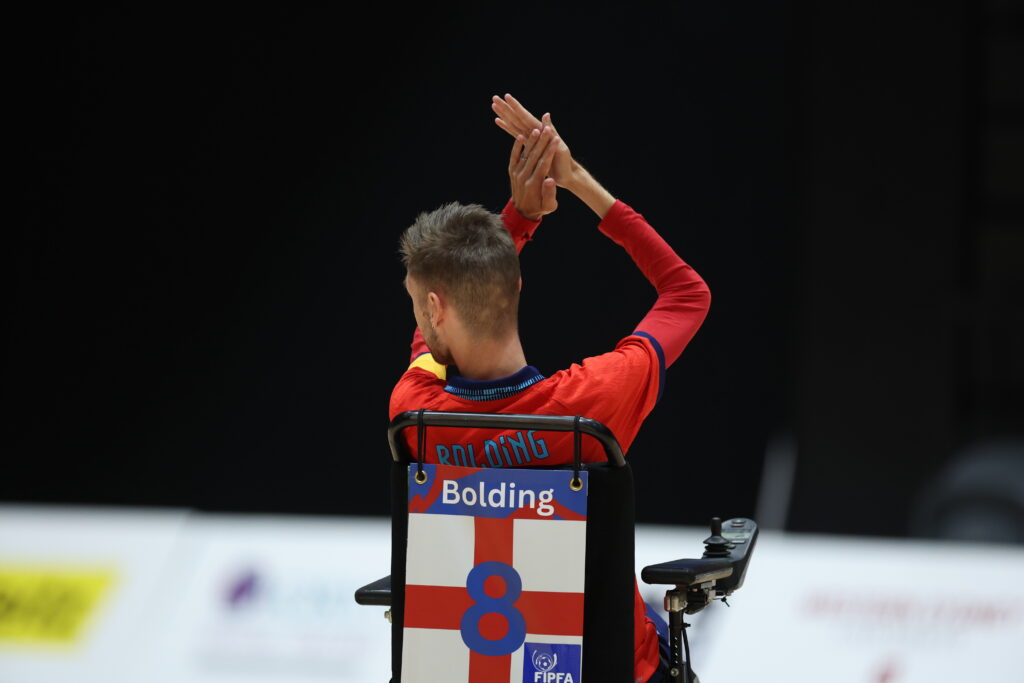England captain Jon Bolding on World Cup heartbreak and how powerchair football changed his life
Jon Bolding has recently joined one of the most exclusive groups in the country, becoming one of the very few to captain an England squad to a World Cup and European Championship final.
In October, Bolding donned the armband to lead England to the 2023 FIPFA Powerchair Football World Cup final in Australia having lifted the European Championship trophy with the squad in 2019.
Powerchair football, then, has made Bolding one of the most successful captains in English history. Yet the sport has also impacted him in ways he could never have imagined when he first started attending Arsenal games with his dad as a child.

“It’s changed my life. I wouldn’t have met half of the people I’ve met in my life or visited half of the countries that I’ve visited if it wasn’t for powerchair football,” says Bolding.
“I always say to myself that if I had the chance to go back to when I was born and not be disabled, I wouldn’t change that for what I’ve gone through in life. The things that I’ve achieved and experienced people can only dream of.”
“It made me feel equal with everyone else.”
Bolding grew up an avid football fan and participated weekly with a pan-disability football team run by Wimbledon FC.
“I used to walk in callipers, but I couldn’t run around the pitch,” Bolding explains. “I would just stay in goal or defence and not move. If the ball came to me great, but other than that, I couldn’t really do much. It was a sport that I could do, but not to my full potential.”
That was until he discovered powerchair football. Bolding attended the first ever powerchair tournament to be hosted in the country and, naturally, won.

“I’ve never looked back since,” he says. “In my brain, I always wanted to play football and powerchair football allowed me to do on the pitch what my brain was telling me I wanted to do. It made me feel equal with everyone else.”
Powerchair football provided a level playing field where success was determined by technical ability, as everyone plays with the same chair. It enabled Bolding to feel part of a team, something often taken for granted in sport.
“Powerchair football started my life in a way I never expected. It just gave me what everyone in sport likes, which is being part of a group,” he says.
“I got married, left my wedding at 1am, and managed to play the Saturday and Sunday games.”
Having just got a taste for the sport, Bolding was involved in a group of players integral in getting the sport up and running in England.
Bolding got his first taste of the sport while it was still in its infancy and subsequently played a pioneering role in the England setup. The FIFPA constitution was only written in July 2006, a process in which the England captain also played his part.
It was seven years late in 2013, that the FA would take over the England Powerchair Football team and make them a fully-fledged England team, with kit to boot. Their first tournament as an official England team would be in Ireland just a year later.
“It was one that I’ll never forget. That year I was also meant to be getting married,” says Bolding.
Having set the date of his wedding to ensure it did not clash, the tournament was then rescheduled, starting on the day of his wedding instead.
“I was like, ‘Why? Why does this have to happen now?’ It was our first official one and I’d get an official England cap,” he recalls.
“Originally, I said I wasn’t going to go, but as it got on and I was still going to the England camps, I built up the courage to ask my wife if I could go to the tournament after my wedding.
“So, I left my wedding at 1am in the morning, drove to Stansted Airport, got on a flight straight over to Ireland. I managed to play the games Saturday and Sunday. We got to the final but came runners-up and then I went on my honeymoon on the Monday.”
“We want people to see us as pioneers of the sport.”
Since that first tournament as the official England team, the Para Lions have developed a unique playing style. It was on display as they became European Champions in 2019, defeating France on penalties in the final. They looked to continue such aesthetic play at the World Cup in Australia this October.
“We are a lot different to other countries. We try and play a passing game, our keeper is heavily involved in the pitch, whereas other countries have a goalkeeper that doesn’t come out-of-the-box,” Bolding explains.
“Our style of football is attractive on the eye. We want people to look at us and see us as the pioneers of the sport.”
An attractive style does come with its challenges and England were not immune. Despite good results in their opening matches, they saw defeats to the USA and France during the group stages.
But they soon found their rhythm, qualifying for the semi-finals and this time beating the USA with a 1-0 win.
“We worked hard on coming up with a way of counteracting their set pieces because they score most of their goals from corners and kick-ins. We were over the moon with that performance,” remembers Bolding.
“All the emotions just came out.”
That set up a final with France, familiar opposition from their final victory at the European Championships. The sides, however, could not be separated in normal time with the game ending 1-1 and so it was down to penalties once more.
In the lead up to the World Cup, rule changes, made by those who do not play the game, have made penalties harder. Goalkeepers are now allowed to sit sideways and move prior to the kick being taken, whereas before they had to sit forward and wait for the kick to be taken.

England lost the shootout to France, but travelled home as the second best powerchair team in the world.
“When we got to penalties I kind of had [the rule change] in the back of my mind and thought it could turn out the way it did,” says Bolding. “I was obviously disappointed, but I wasn’t too downhearted.
“After about half an hour or so, I just broke down because we’d worked so hard. I left my daughter and wife at home to be there. It was a lot of sacrifices, and all the emotions just came out.”
“No one knew that we went to the final.”
England were in the final of a World Cup, yet you would not know. Other than a couple of posts from the official England social media channels, there was very little publicity surrounding the achievement.
This is reflective of how overlooked disability sport continues to be in the media.
“There’s so much more that the mainstream broadcasters can do, not just for us, but for all para teams,” insists Bolding.
“You never see disability sport on telly regularly. It’s always a big occasion because it’s hardly ever on.”
Not only does this mean the team do not receive the plaudits, visibility and sponsorship they deserve, it also means there is limited awareness that the sport exists.
“One thing I want to do before I stop playing is get powerchair football out there to people that don’t know about it,” says the England captain. “Especially to disabled people because I don’t want them sat at home thinking there isn’t a sport they can play.
“I want them to know that there’s a club available around the corner that they can visit that could change their life like it changed mine.”
“I’ve got the World Cup and the Champions League, then I’ll have ticked it all.”
Looking ahead, the dream for the sport would be inclusion in the Paralympic games where visibility would soar.
“I would love it. That’s the pinnacle for us,” enthuses Bolding. “It would draw in millions of people. The Paralympics is the next major step that we need to showcase to the world what we do.”

For now, however, Bolding is focusing on his return to club football with Aspire PFC. They play their next games in the Premiership on the 9th/10th December at Lee Westwood Sports Centre, Nottingham.
Aspire will also compete in the Champions League in France where Bolding hopes to add another accolade to his already packed honours list.
“I’ve got two more things to win. I’ve got the World Cup and the Champions League, then I’ll have ticked it all and I can happily retire. But, until then, I’ll be hanging around for a little while.”